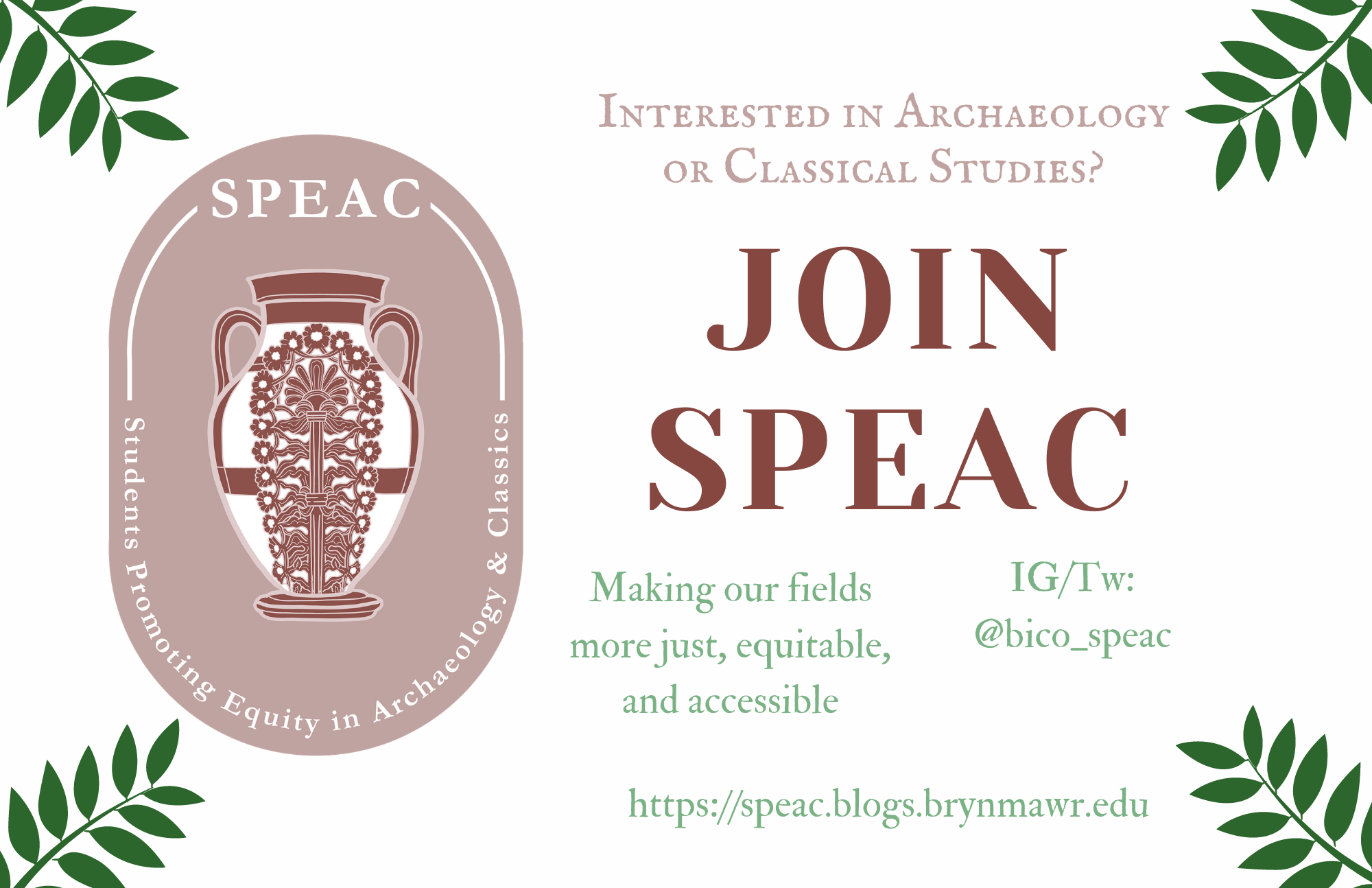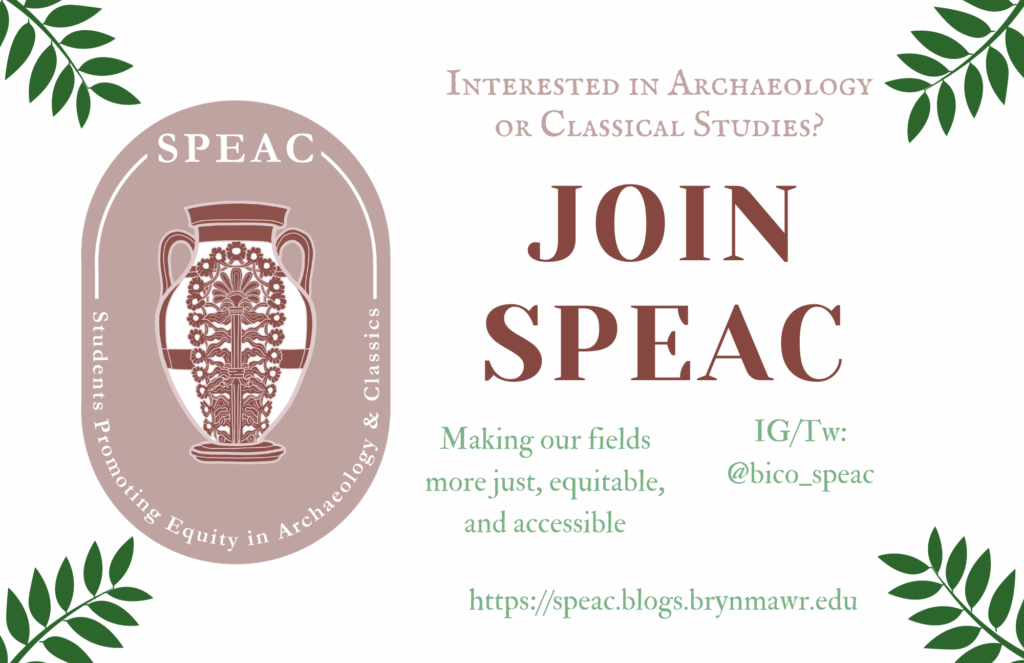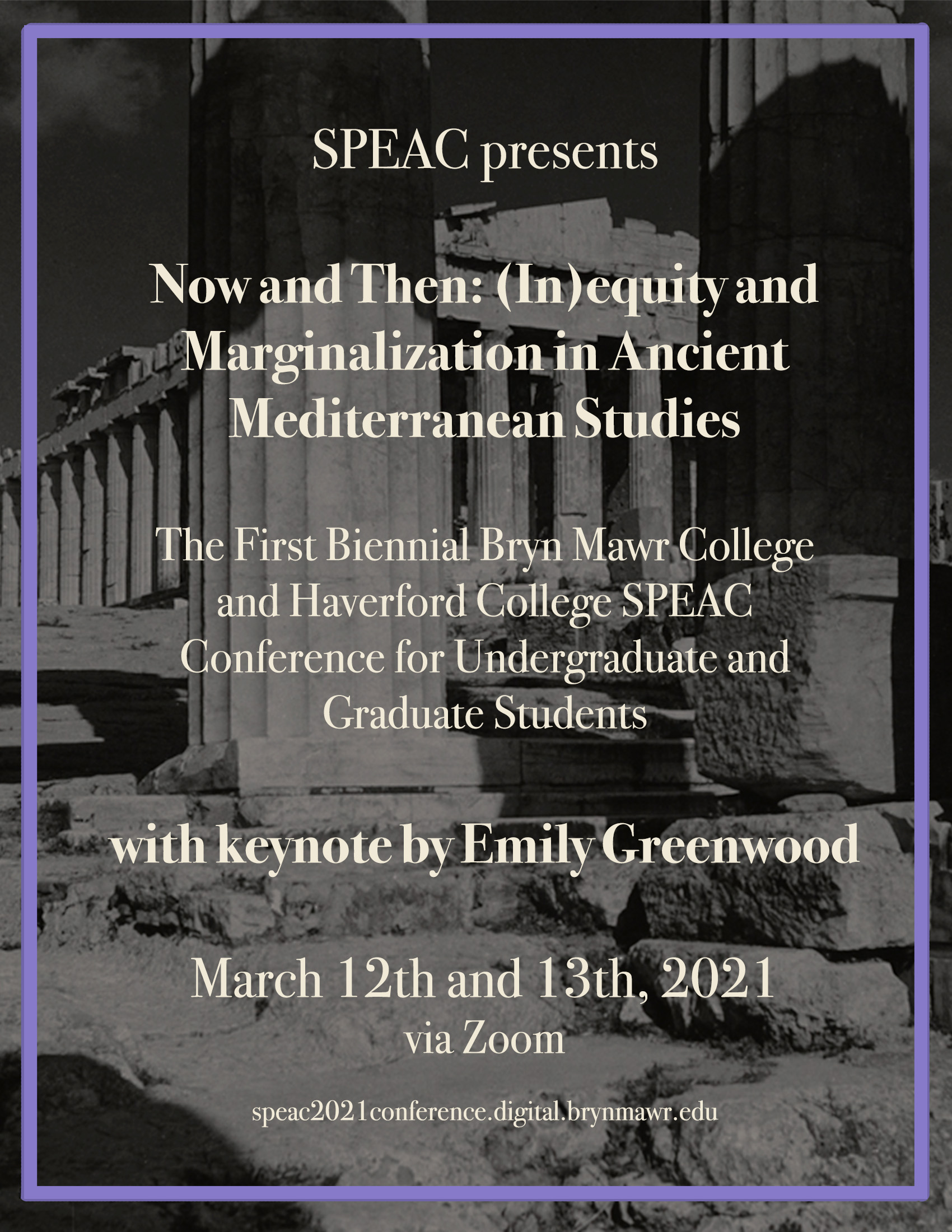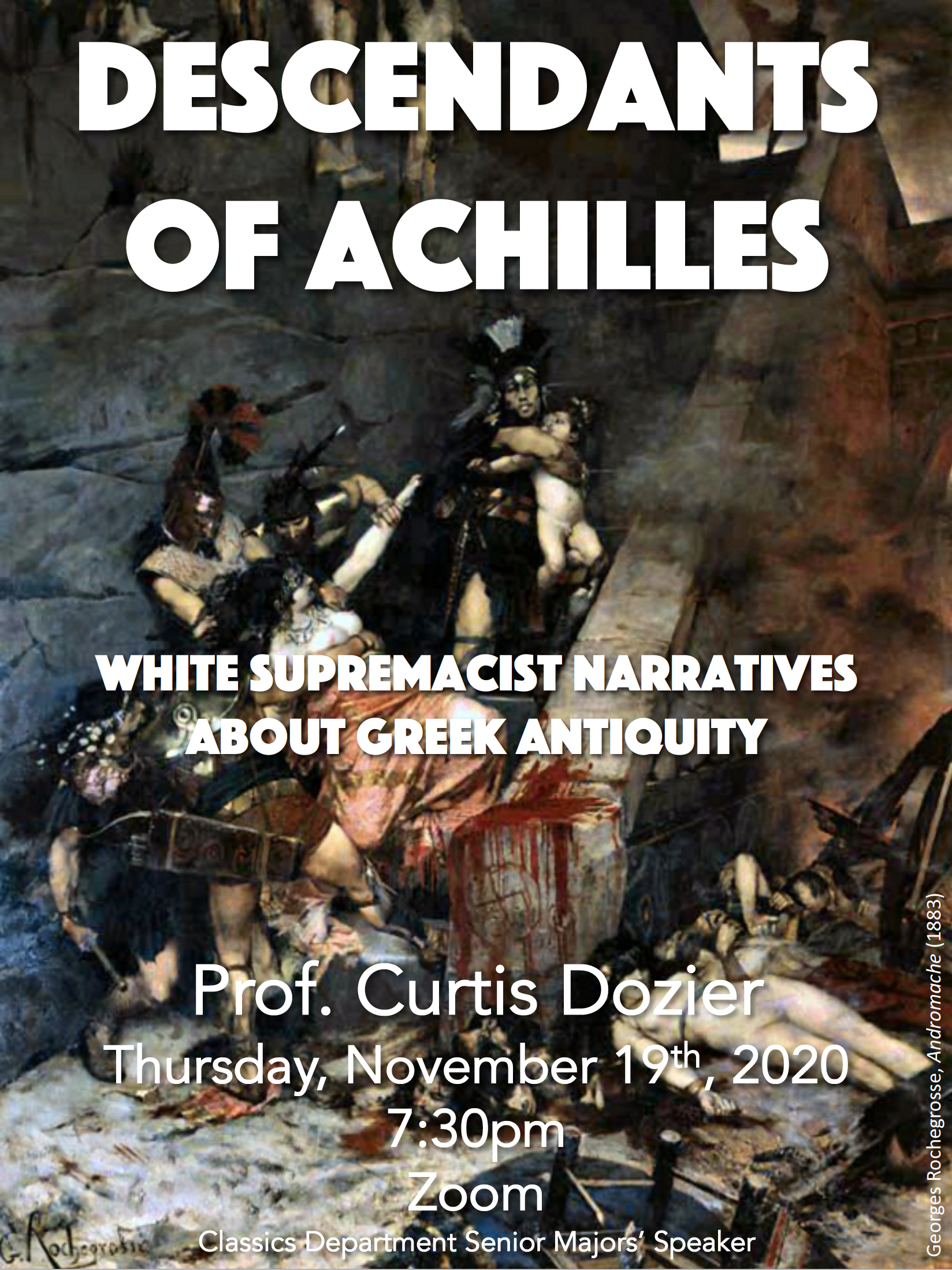You can find our updated departmental equity plan here! As always, we appreciate your feedback; you are welcome to contact any of the faculty directly, or to write to us through our anonymous comment box.
The Retirement of Prof. Deborah Roberts
Comments deliverred by Prof. Matt Farmer to the assembled Haverford faculty on May 26th, 2021
Deborah H. Roberts is retiring this year from her position as the William R. Kenan Jr. Professor of Classics and Comparative Literature.
Deborah began her long association with the TriCo when she graduated from Swarthmore in 1971. After taking her MA from Stanford in 1974 and PhD from Yale in 1979, she came to Haverford as an instructor in 1977, becoming Assistant a few years later, earning tenure and promotion to Associate in 1985, and rising to full Professor in 1996, before becoming first the Barbara Riley Levin Professor and now the Kenan Professor.
Deborah’s research has been extraordinarily wide ranging. Her early work focused on Greek tragedy, with a monograph on Apollo and His Oracle in the Oresteia, followed by a series of articles focused on the notoriously puzzling and even alienating endings of Greek tragedies; these articles remain foundational, and are widely cited to this day. Deborah’s interest in “endings” culminated in her co-editorship of the volume Classical Closure: Reading the End in Greek and Latin Literature. Readers of ancient literature to this day turn to this volume when they wish to know why the final words of the Iliad, a poem supposedly about the rage of Achilles, are “thus they buried Hector, breaker of horses.” Perhaps more importantly, though, this volume marked a turning point in the field of Classics; though the discipline had long remained insulated from the world of literary critical theory, Classical Closure demonstrated that these new methodologies could produce important new readings of canonical Greek and Roman literature.
Classical Closure presents us with two of the striking themes of the second half of Deborah Roberts’ research career: theoretically-informed criticism in the mode of what we might call comparative literature; and collaboration. Her co-editors to this volume, Francis Dunn and Don Fowler, were two of the guiding lights of Classics’ late but crucial turn to theory. In subsequent years, her foremost collaborator was her close friend, Main Line neighbor, and Penn colleague, Sheila “Bridget” Murnaghan. In the mid-2000s, Deborah and Bridget turned their attention to the reception of classical culture and mythology in children’s literature, with regular presentations at the Warsaw-based “Our Mythical Childhood” conference, articles like the forthcoming “New Hope for Old Stories: Yiyun Li’s Gilgamesh and Ali Smith’s Antigone,” and the co-authored volume Classics and Childhood: Britain and America, 1850-1965 (Oxford UP 2018).
Many students of the Classics may know Deborah best as a translator. Her translations of Greek tragedies, including Prometheus Bound, Euripides’ Andromache, and Euripides Ion are widely read and regularly assigned by me and, frankly, everybody else who teaches these texts in English. She is also a prominent theorist of translation, with a particularly notable series of publications on the translation of obscenity, colloquialism, anachronism, and “the forbidden.”
Her scholarship is very much ongoing; we await the publication of a chapter on the translation of The Persians for the Blackwell Companion to Aeschylus, as well as, sensibly enough, Deborah’s own translation of The Persians, forthcoming from Hackett; she’s currently completing her contribution to a new, collaborative translation of Nonnus’ monumental Dionysiaca; and has forthcoming articles including “Translating Homosexuality: Jack Lindsay and His Illustrators,” and a review of Emily Wilson’s celebrated new translation of the Odyssey.
Deborah has taught, if I’m doing the math correctly, every course the Haverford Classics department has ever come up with, in Greek, Latin, or Classical Studies. Her best-loved courses have often been those that drew on her research, including the much-sought-after pair “Translation and Other Transformations: Theory and Practice,” and “Refashioning the Classics: Voicing Myth.” Her teaching has repeatedly been recognized, including with the Lindback Teaching Award here in 1986. In fact she can boast a recognition of her teaching which as far as I am aware is almost unparalleled: even as a graduate student her teaching was so inspirational that Yale now awards annually the Deborah H. Roberts Teaching Prize to its best graduate instructor.
Deborah’s mark on Haverford’s curriculum really cannot be overstated: among many other achievements, she engineered the new era of collaboration between Haverford and Bryn Mawr’s classics departments which has become so essential to both departments’ success and identity; and she was a founding member of the program in Comparative Literature, the college’s first interdisciplinary major.
Finally, I would be remiss if I failed to mention Deborah’s unequalled contributions to the running of this institution. Over the course of four terms she served as clerk of the faculty for more than a decade; she has chaired both Classics and Comparative literature numerous times; she has joined and indeed chaired untold search committees; and most recently she served as Director of the Hurford Center for the Arts and Humanities, helping oversee the rebirth of the Center in its new home in VCAM.
Deborah’s kindness and generosity are, I suspect, well known to each of you, particularly the many people who have experienced the profound hospitality of a meal or a drink at Aryeh and Deborah’s home, in the various incarnations that home has taken around this campus over the decades. As my colleague Bret Mulligan put it, “one would hard-pressed to think of any request that she’s ever declined from students or colleagues;” she has a sense of “compassion born from a deep desire to do good by everyone in her orbit.”
I first met Deborah as a result of one such act of kindness, when I was a graduate student at Bryn Mawr writing on the Prometheus Bound and she volunteered, for no particular recompense, to serve on my MA thesis committee. In an off-hand way, she remarked at my thesis defense that she thought the word I had been searching for in an awkward methodological passage of the thesis was “intertextuality,” a topic which became in that moment and has remained since the central subject of my research career. Many of you have known Deborah much longer than I have, and I trust to your memory and to your esteem for her to fill in the many undoubted gaps this brief survey of her career has left. But as her former student and now colleague, it is with a deep sense of gratitude and honor that I ask you, if only for a moment, to unmute yourselves and join me in offering applause and congratulations on the retirement of Professor Deborah Roberts.
Creating Classics: Spring 21 Exhibition
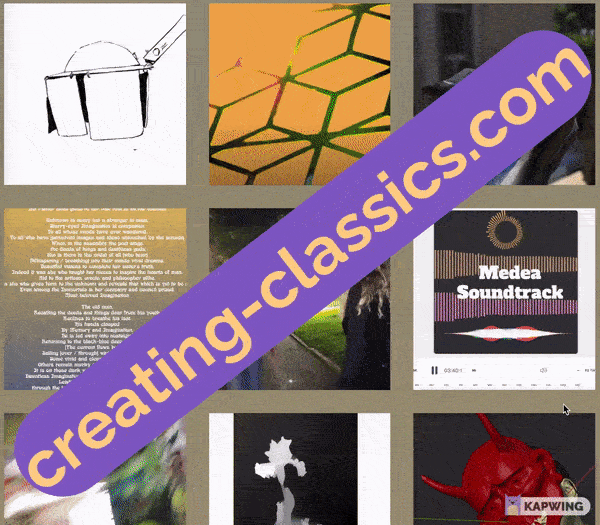
In the middle of a global pandemic, the students in Creating Classics gathered every Tuesday evening (7-10pm EST!) to discuss Greek tragedies and the films of Pier Paolo Pasolini. We watched movies, read and reenacted dramas, looked at ancient and modern paintings, and talked about the past as science-fiction, the liquidity of antiquity, the perils of universalism, and the ancient archaeology of modern cinema.
The course was co-taught between Classics and Italian, and cross-listed with Film, Africana, Gender & Sexuality, Visual Studies, Comparative Literature, and Theater, with the additional support of the team at Haverford VCAM.
The culmination of our work is on display through our Spring 21 Virtual Exhibition. Here, you’ll find each team member’s artifact, a reflection of their conceptual and technical take on reception, classicism, and spectacle.
As you make your way through the exhibit– the poetics and aesthetics of which were conceptualized by the students— we invite you to click on the animated thumbnails to see, hear, and/or read each member’s work as well as the artist’s statement. On display are also selections from their creative portfolios, “translation” experiments which were made weekly throughout the semester. And don’t forget to end your trip with the “silly (and shady) version” of the exhibition!
Congrats to the students in Creating Classics on all their hard work and the launch of this wonderful exhibit!
Spring Workshops
This spring, Haverford Classics offered two more workshops in our continuing series, which was inspired by the work of the strike organizers in fall 2020 and the teach-ins that arose during the strike.
On Wednesday, March 31st, we presented “Naming Our Field,” a discussion of names for our discipline and department. You can find slides from the workshop here.
On Thursday, April 15th, we presented “Shelly Haley’s ‘Be Not Afraid of the Dark,'” a discussion of Prof. Haley’s foundational article on critical race theory and classics. You can find the article here; read more about Prof. Haley (currently president of the Society for Classical Studies) here; and download slides from the event here.
If you attended either of these events and would like to leave feedback, you can do so here.
Join SPEAC!
Anti-Racist Reading Group
Inspired by the reading group created by UPenn Classics graduate students, SPEAC (Students Promoting Equity in Archaeology & Classics) has partnered up with faculty from the departments of Archaeology and Classics to start our own BiCo anti-racist reading group.
Our first meeting will be held on Thursday February 11th at 2pm via Zoom, and we will be discussing the article “Decolonization is not a metaphor” by Eve Tuck and K. Wayne Yang. As a heads up: it is challenging. Don’t be put off by that, because it’s well worth the time and energy. We recommend reading it in chunks over a few days if you need to. We purposely scheduled this before the semester and during the undergrad quarantine period so that we can jump into the reading group before assignments start piling up.We will meet a couple times every semester to discuss a pre-circulated article. Each meeting will be run by students from SPEAC and will consist of both large-group discussions and smaller breakout rooms. This will be a chance for undergraduate students, graduate students, and faculty members to all learn together and improve our community. While we encourage you to do so, you are not required to read the article in advance, so please don’t let that deter you from participating in the conversation!
Please register for the Zoom meeting here. This event is open to all BiCo students and faculty in Classics, Archaeology, and related fields. Please feel free to invite anyone you think may be interested. And as always, if you have any questions or comments, or if you wish to get involved with SPEAC or suggest a future reading, don’t hesitate to get in touch.
Now and Then: (In)equity and Marginalization in Ancient Mediterranean Studies
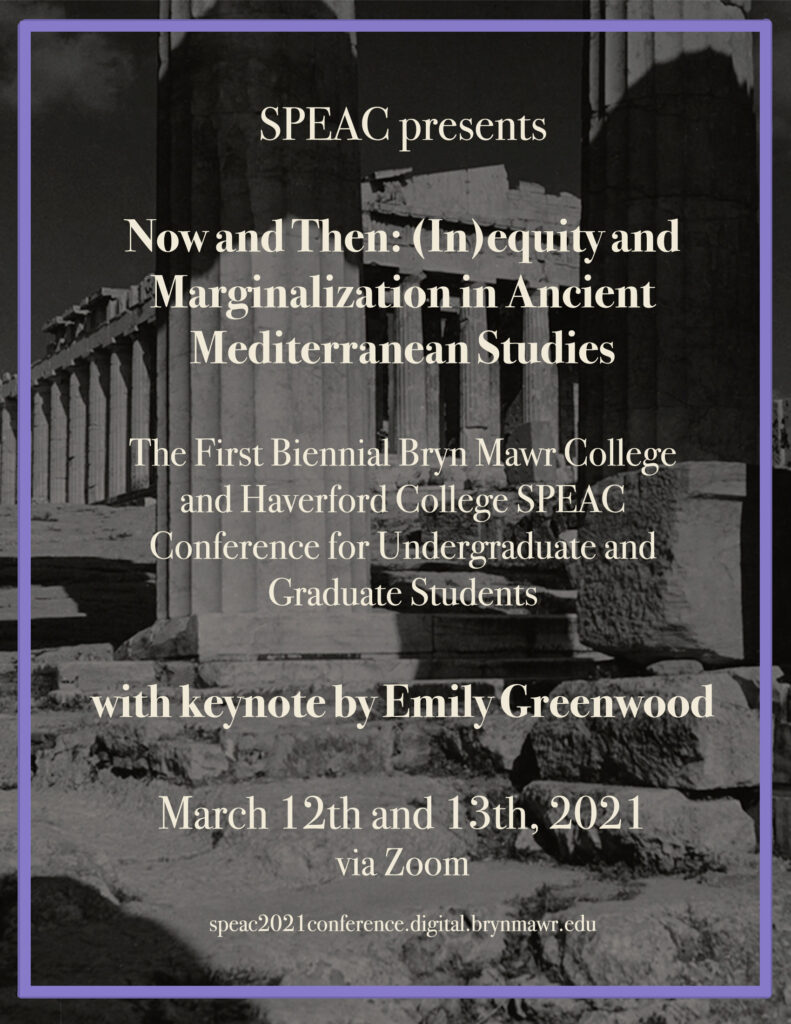
Equity Plan Updated
As part of our ongoing work to improve equity, diversity, and inclusion in our department, we have published an update to the equity plan we initially shared over the summer. You can find the updated plan here! As always, we appreciate your feedback; you are welcome to contact any of the faculty directly, or to write to us through our anonymous comment box.
Descendants of Achilles: White Supremacist Narratives about Greek Antiquity
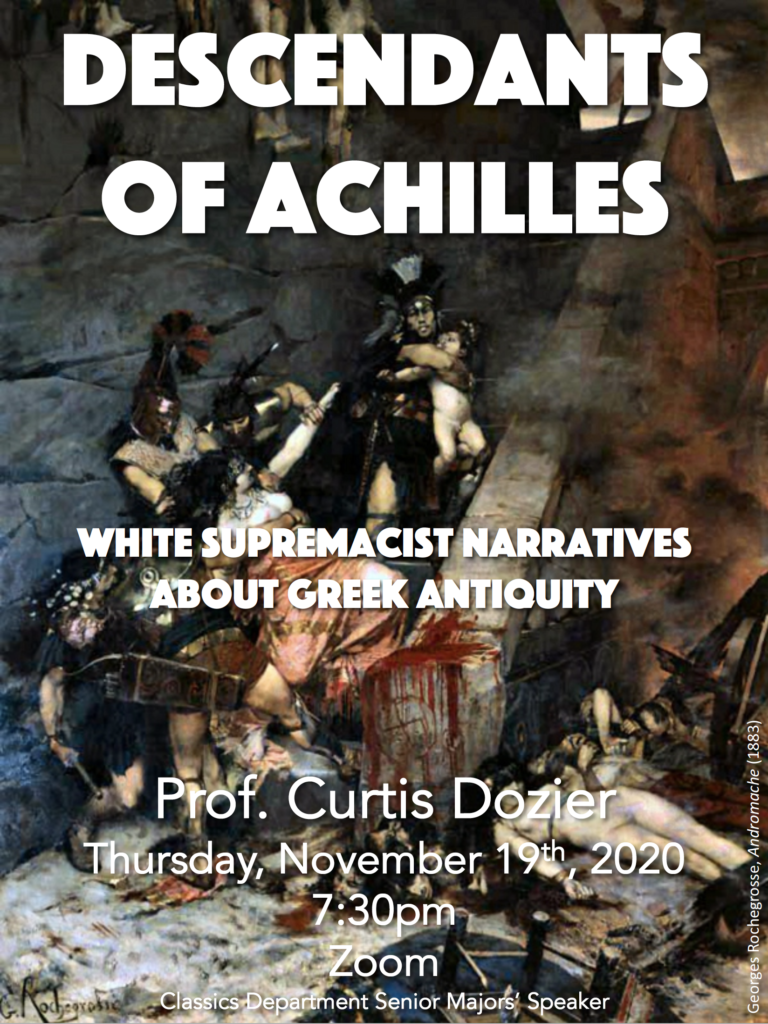
The ancient Greeks are very important to the contemporary white supremacists whose work I document on my website Pharos (pharosclassics.vassar.edu). They regard the ancient Greeks as genetic and spiritual ancestors of modern white people. For them, the philosophical, literary, artistic, and political accomplishments of the Greeks are proof of white superiority. And they find in the disappearance of the classical city-states a warning about the existential threat that they believe white people face in the contemporary world. This lecture will survey the aspects of ancient Greek culture that these groups use to establish these genealogical and ideological connections. Studying such overtly racist assumptions of ancestry, inheritance, and origins throws into sharp relief the often implicit racial politics of the way the study of Classics has often been justified in schools and universities.
Antiracism Workshops
On November 10th and 11th, 2020, the Haverford Classics Department hosted a pair of workshops showcasing antiracist work in our field. These workshops were inspired by the teach-ins held during the fall 2020 strike. To view the recordings, you will need to sign in with your TriCo login credentials; if you have trouble accessing any of the links below, please contact Prof. Farmer.
Racism and Classics
View recording
Download slides
Race in the Ancient Mediterranean World
View recording
Download slides
Feedback
If you attended either of these workshops or viewed the recordings and would like to provide anonymous feedback to help us improve future workshops, please click here. If you have other questions or concerns, you can also contact any of the departmental faculty, or use our anonymous comment box.
